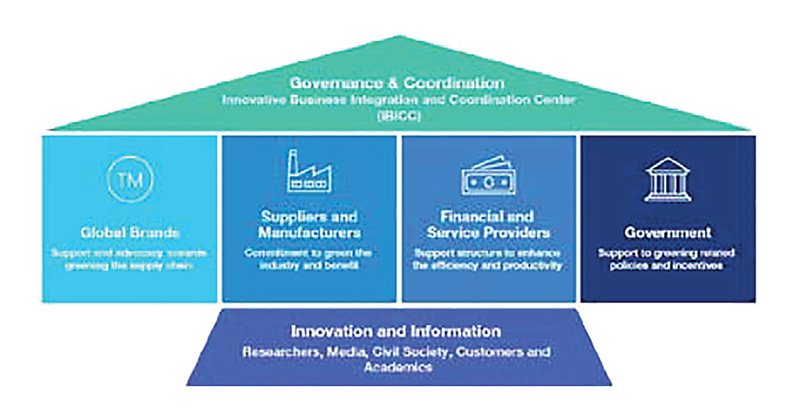Tuesday Feb 17, 2026
Tuesday Feb 17, 2026
Friday, 10 September 2021 01:41 - - {{hitsCtrl.values.hits}}

The challenges faced by the Sri Lankan apparel sector in this not-yet-post-COVID19 new normal may seem insurmountable, particularly in respect to sustainability. But as Nelson Mandela stated, “It all seems impossible until it is done”. Some of our own Sri Lankan manufacturers have beaten the path to sustainability for others to follow. Yet there are some challenges that we must overcome.
Lack of Access to Funding
While the larger manufacturers are preparing sustainability plans to highlight green endeavours and improved operations to buyers and international brands, small and medium sized enterprises (SMEs) languish due to lack of awareness, lack of expertise and most importantly, lack of financing for greening their operations.
Funding for renewable energy, resource efficiencies and pollution can deliver immediate returns. With financial support SMEs can invest in greener technologies and engage technical experts for using innovative tools like Life Cycle Analysis, Cleaner Production, Zero Discharges, Science Based Targets and Renewable Energy Proportion.
Buyers, Bankers and Sustainability
The short-term purchasing practices of SME manufacturers’ buyers do not incentivize resource conservation as a long-term strategy. Technologies with longer-term paybacks, financing resource conservation through balance sheets or providing guarantees on sourcing and financing are not welcomed with enthusiasm.
The local financial sector is yet to make a strong commitment to offer sustainable funding to Sri Lankans. There is little emphasis on clients’ environmental, social and governance (ESG) performance in loan approvals.
If going green is neither valued nor appreciated by their customers or their banks, why bother? One word: Profitability. SMEs can significantly improve their cost structures and profitability through green initiatives.
A Greener Nation
Beyond profits, as a nation we must encourage all industries to optimize resource use and reduce harmful chemicals. This helps save money, conserve water, green our energy mix and prevent pollution. Sri Lanka as a greener manufacturing destination and a greener nation will be more attractive to sustainability conscious investors, buyers and tourists. The ongoing drive for organic agriculture is complementary to this mission.
Greening Success Through Collaboration
At present the primary coordination role for the apparel sector is provided by the Joint Apparel Association Forum (JAAF), formed to promote Sri Lanka as a “Preferred Sourcing Destination”. Achieving a greener apparel sector requires a lot more support beyond JAAF’s capabilities. We need all-hands-on-deck to reach this goal and a national level driver, coordinator and catalyst for true change.
JAFF could be strengthened with an information-driven facilitation platform as a public-private-partnership. And it requires tremendous coordination and collaboration efforts; with multiple Ministries and implementing agencies and other stakeholders in the success of the apparel exporters; with the Export Development Board (EDB), the BOI, Central Environmental Authority (CEA), the Central Bank and the Sustainable Energy Authority, State and Line Ministries and other stakeholders. Universities, training institutes and thinktanks have a role to play. The marketing profession can help with effective messaging.
The financial sector must play an active role to empower this entire process.
IBICC – To Pull All Strings Together
The HSBC-IUCN report proposes a national-level coordinating entity with international linkages, an “Innovative Business Integration and Coordination Centre (IBICC)”, governed by multiple stakeholders.
This concept is not new. The Partnership for Cleaner Textile (PaCT), supported by the International Finance Corporation (IFC) is a successful South Asian example. PaCT engages with brands, technology suppliers, industrial associations, financial institutions and the government. To date, over 15 major brands have participated in the programme.
We see IBICC playing a key role in promoting cleaner production, transparent monitoring, facilitation of technical assistance, standardization of suppliers, technology identification and piloting and sharing of global experience through exchange of information and expertise. At the core of the effort would be Sustainable Financing. For capacity building across the value chain, we would need ‘design centres’, ‘partnerships with global centres of excellence’, ‘university-industry partnerships’ and ‘public-private-partnerships’.
It is not just about apparel
The successful greening of the apparel sector and the IBICC can be a steppingstone for greening all of Sri Lankan manufacturing and services.
HSBC and IUCN have been working together to formulate a strategy to build a more resilient apparel industry through adoption of greener practices. “A Road Map Towards a Greener Apparel Sector” report is the result of an extensive research conducted by the project team in partnership with the Joint Apparels Association Forum, Board of Investment Sri Lanka, National Cleaner Production Centre and Sri Lanka Bankers’ Association.
To access the full report visit www.hsbc.lk/ApparelSectorResearch